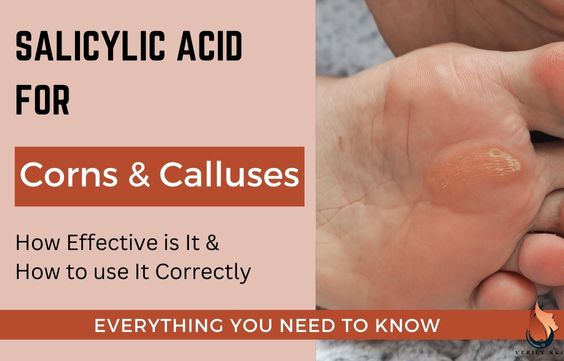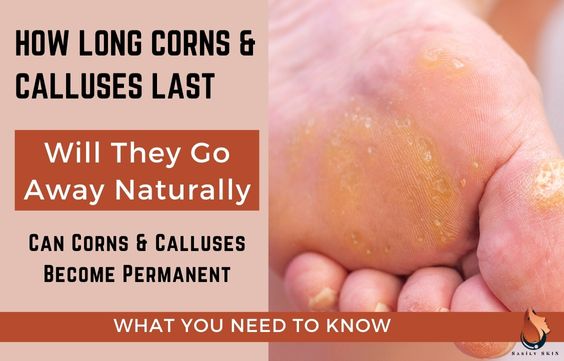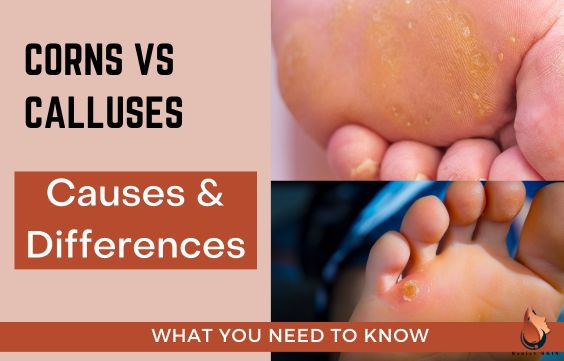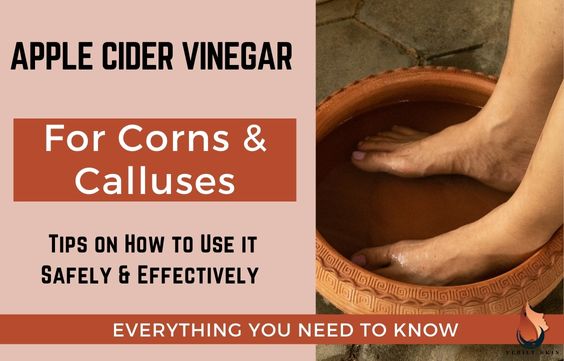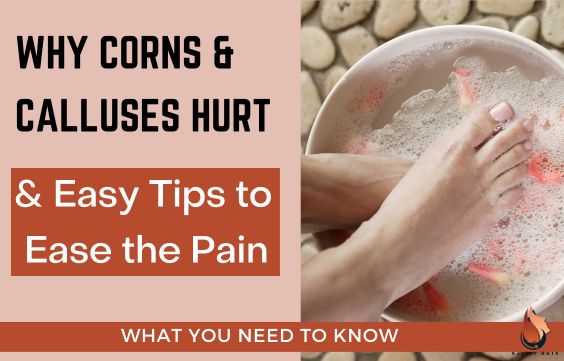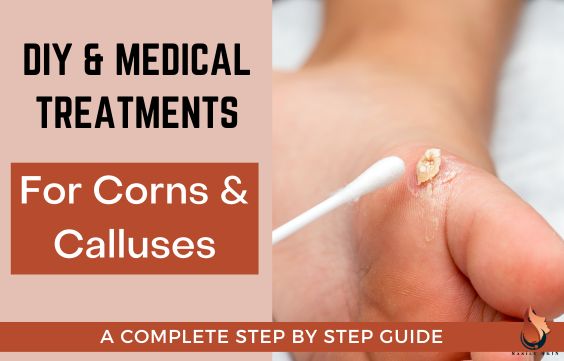Best Essential Oils & Body Oils to Treat Corns & Calluses
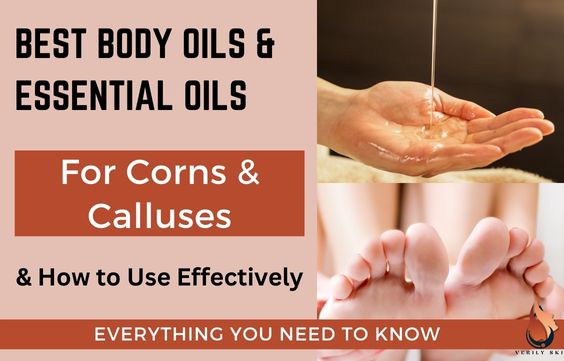
Both essential oils and natural body oils have been used to help manage corns and calluses, but which ones are the best and how do you use them safely and effectively.
Now, this article will be divided up into 2 sections:
- In the first part, we will discuss essential oils such as tea tree oil, and clove oil, and how to use them on corns and calluses.
- And in the second part, we will focus on body oils such as castor oil and coconut oil.
Can Oils Help With Corns & Calluses
Yes. Both natural body oils and essential oils can effectively soften the skin around corns and calluses, making them easier to remove.
Remember that most treatments aim to first soften the skin around the corn and/or callus, and then reduce the thickness by using a pumice stone or file. Finally, we need to prevent further pressure and friction.
You need to read my article on Quick Remedies & Medical Treatments for Corns & Calluses
Salicylic Acid for Calluses & Corns: What You Need to Know
How Can Essential Oils Help To Treat Corns & Calluses
Many essential oils have antimicrobial properties and healing properties, as well as exfoliating and moisturizing properties, all of which help to soften corns and calluses.
Essential oils are known for their antimicrobial properties and some of them also help to remove dead skin cells. This is especially beneficial for corns and calluses.
When mixed with a carrier oil (which is usually a body oil like coconut oil, castor oil, olive oil, etc) essential oils can even be hydrating and/or moisturizing to the skin. The softer the skin around the corn and/or callus is kept, the easier it is to remove it.
Related Articles:
Apple Cider Vinegar For Corns & Calluses – What To Know
Hydrogen Peroxide for Corns & Calluses: How to Safely Use
Best Essential Oils For Corns & Calluses
1- Tea Tree Oil
This oil is widely known for its antibacterial and anti-fungal properties. Whether you are treating a corn or a callus or both, tea tree oil helps to disinfect and loosen the thickened, dead skin cells around them.
Related Articles:
Corns vs Calluses – What are the Differences & Types
7 Tips on How to Prevent Calluses & Corns on Your Feet
2- Clove Oil
Clove oil is antibacterial, anti-fungal, and anti-inflammatory, which makes it very effective at treating corns and/or calluses.
It also numbs the skin around the area which significantly helps to relieve pain and discomfort from tender and painful corns and calluses.
Related Articles –
Infected Corns & Calluses – How To Spot & Treat
How Long Calluses & Corns Last & Do They Go Away Naturally
3- Oregano Oil
This potent oil is a potent natural pain reliever that also has anti-inflammatory, anti-fungal, and antioxidant qualities, all of which can help corns and calluses.
Carvacrol, a substance found in oregano oil, has also been studied for its potential antiviral properties.
Related Article – Tips on How to Prevent Calluses on Your Hands
4- Garlic Oil
According to scientists, garlic plant oil includes a variety of vitamins and antioxidants that are excellent for treating corns.
To combat bacterial and fungal diseases, both of which are connected to the final stages of a corn’s growth, oils like this, with antioxidant properties, can be employed.
Related Article – Why Do Corns & Calluses Hurt & Easy Tips to Ease the Pain
5 – Lavender Oil
Lavender essential oil can quickly eliminate further growth when applied straight to a corn or callus. For the greatest benefits, you should apply the oil around three times each day.
The anti-fungal, analgesic, and anti-inflammatory properties of lavender essential oil help in the struggle against the fungus that causes corns and calluses. Additionally, it offers calming benefits that lessen the stress and discomfort brought on by corns and calluses.
6- Peppermint Oil
Peppermint is known for its antiseptic and anti-inflammatory properties. The menthol found in peppermint also clams the skin, soothes it, eases pain, and encourages exfoliation by loosening dead skin cells. All this makes it great for corns and calluses.
7- Roman Chamomile Oil
Roman chamomile essential oil can be used to soften and relieve calluses and corns since it contains anti-inflammatory properties. A corn or callus eventually disappears when the oil is directly applied.
8 – Turpentine Oil
Both corns and calluses can be treated with turpentine essential oil. It lessens pain and stops infection when it is absorbed into the skin. Calluses or corns often deteriorate and finally shed.
9 – Lemon Oil
Lemon oil can be used to treat calluses and corns on the feet. It has anti-fungal and anti-inflammatory properties that help combat the fungus that contributes to the worsening of corns and calluses on the foot. You may apply it on your feet or add a few drops to warm water to soak your feet in it.
How To Use Essential Oils For Corns & Calluses
The best way to use essential oils for corns and calluses is to mix them with a carrier oil and apply the mixture directly to the corn and/or callus.
You may use any carrier oil of your choice. It is best to use one that is soothing and hydrating. Since the essential oil will already be intense, you should not use one that is too harsh on the skin, but rather more moisturizing.
The most commonly used carrier oils are:
- Coconut Oil
- Olive Oil
- Jojoba Oil
- Sweet Almond Oil
- Argan Oil
- Rosehip Oil
- Black Seed Oil
- Sunflower Oil
- Avocado Oil
How to Mix Essential Oils with Carrier Oils For Corns & Calluses
It is best to use organic, cold-pressed carrier oils from a trusted manufacturer when mixing them with essential oils for corns and calluses.
When mixing essential and carrier oils, follow these dilution guidelines:
For adults
- 2.5% dilution: 15 drops essential oil per 6 teaspoons carrier oil
- 3% dilution: 20 drops essential oil per 6 teaspoons carrier oil
- 5% dilution: 30 drops essential oil per 6 teaspoons carrier oil
- 10% dilution: 60 drops essential oil per 6 teaspoons carrier oil
For children
- 0.5 to 1 % dilution: 3 to 6 drops essential oil per 6 teaspoons carrier oil
Store the mixture well, preferably in a cool, dark place (some can be refrigerated), and always shake well before each use.
Also always patch-test the mixture on a small part of your skin before going ahead with the full application.
How Can Body Oils Help To Treat Corns & Calluses
Body oils, like coconut oil, olive oil, castor oil, etc. can help to moisturize and soften corns and calluses so they do not crack and bleed.
The oils also keep the skin soft around the corn and/or callus, preventing them from getting even thicker. They also make it easier to remove the skin when it is time for the pumice stone or file.
Many of these oils are also antimicrobial to some extent and can help to prevent infections between any existing cracks in the skin. Usually, fungal infections are a complication of the later stages of corn and/or callus development.
6 Best Body Oils For Corns & Calluses
The best body oils to use for corns and calluses are moisturizing ones. These will soften the skin around corns and calluses, making them softer and easier to remove.
Keeping the skin soft and moisturized also prevent the skin from continuously thickening again.
1- Castor Oil
Castor oil contains characteristics that make it a natural lubricant for the skin which is useful when you’re attempting to condition your skin so that you can remove a callus.
5 teaspoons of castor oil added to warm water or another, thinner oil should be sufficient to lubricate the callus’ rough skin and calm the problematic spot.
2- Coconut Oil
Coconut oil, which is rich in vitamin E, may be used as a conventional moisturizer. It serves as a type of barrier on the skin, keeping moisture in by being rich in fatty acids.
Because of its inherent antibacterial and anti-fungal properties, it helps shield skin and hair from microbes and infection. These properties are great for managing corns and calluses.
3- Olive Oil
Olive oil may serve as a second skin barrier for dry, cracked skin and is an effective skin moisturizer. This is great for corns and calluses.
Olive oil’s anti-inflammatory and antioxidant qualities are two more wonderful advantages. Dermatologists claim that the anti-inflammatory components in olive oil promote collagen formation, which promotes wound healing.
4- Sweet Almond Oil
Sweet almond oil is hydrating and increases the rate of skin cell turnover. This means that it is great for keeping the skin soft while encouraging exfoliation which will help to make corns and calluses flatter and flatter.
5- Jojoba Oil
Jojoba oil, which is rich in healthy minerals and nutrients, functions as an emollient to calm skin and give all-day hydration. This keeps the skin soft and easier to remove the dead skin cells from over and around the corn and/or callus.
6- Rosehip Seed Oil
The vitamins E, C, D, and beta carotene are present in this oil, which is high in vital fatty acids. It fights free radical damage and protects and hydrates skin.
By encouraging healthy collagen formation, vitamins and antioxidants also revitalize the skin to restore suppleness. Calluses and corns will heal quickly thanks to this.
How To Use Body Oils For Corns & Calluses
It is best to use the virgin, cold-pressed version of body oils and apply them directly to the skin for the best results (except for castor oil, which needs to be mixed).
Here are some tips to follow:
- You may apply the oils to your skin once or twice every day, especially after showering. You may also apply them as often as you feel necessary.
- Castor oil is very thick and can be potent. Therefore, it can be diluted with a thinner oil like coconut oil or any other one, or it can be mixed with water as a soak.
- Even though these oils are usually safe to use, patch test your skin first to avoid any potential allergic reactions or sensitivity reactions.
3 Effective Oil Remedies For Corns & Calluses
1- Castor Oil & Essential Oil Mix
Ingredients/Materials:
- 10 ml Castor Oil
- 20 ml Sweet Almond Oil or extra virgin Olive Oil
- 5 drops of Chamomile Oil
- 3 drops Lemon Oil
- Storage Bottle or Container
Directions:
- Mix all the oils in a bottle or container.
- Make sure they are well combined.
- Apply directly to the corn and/or callused area of the foot.
- Cover the area with a bandage or a sock so that the oil can work on the area all night or all day.
2- The Pumice Rub
Ingredients/Materials:
- 12 drops of Chamomile Oil
- 12 drops of Peppermint Oil
- 60 mls of Jojoba Oil/ Sweet Almond Oil/Coconut Oil or any carrier oil of choice
- Pumice Stone
- Storage bottle or container
Directions:
- Mix all of the oils in a bottle or container and shake well to combine.
- Apply the mixture directly to the corn and/or calluses 3 times a day for about a week.
- After a week, soak your feet and use a pumice stone to exfoliate the corn and/or callus.
- After exfoliation, keep applying the mixture to the area every day until you are ready to use the pumice stone again.
3- Turpentine Tea Tree Mix
Ingredients/Materials:
- 2 drops of Turpentine Oil
- 2 drops of Tea Tree Oil
- 1 tablespoon of Olive Oil
- 1 tablespoon of Apple Cider Vinegar
- 1 teaspoon of Baking Soda
- 1 Bowl of warm water
- Towel
Directions:
- In a bowl that is big enough for your feet, dissolve the baking soda and soak your feet for about 20 minutes.
- Pat your feet dry with a towel and apply the Apple Cider Vinegar directly to the corn and/or callus. Leave them to dry.
- When dry, combine the tea tree oil and turpentine oil with the olive oil. Use a Q tip to apply the mixture directly to the corn and/or callus. Leave this mixture on the areas.
- Repeat this every day for a week. Your corn and/or callus should be significantly better after at least one week.
Sources:
Essential Oils for Corns | Natural Oils Treatment for Foot Corns
Carrier Oil: Types, Use, and More
Essential Oils For Calluses: When You’re Tired Of Corns, Blisters, And Calluses

